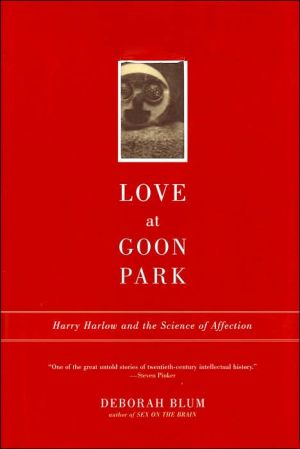

 |

|

The average rating for Love at Goon Park: Harry Harlow and the Science of Affection based on 2 reviews is 5 stars.
Review # 1 was written on 2008-02-23 00:00:00 Daniel Lemieux Daniel LemieuxIt's hard to believe that less than 100 years ago, psychologists believed that affection between parents and children was unnecessary, and recommended that the best way to raise children was to touch them and coddle them as little as possible. The behaviorist B.F. Skinner actually built a box to raise his young daughter Debbie in, with a window and filtered air and regular times when she could emerge to play or eat meals. Harry Harlow, a primate researcher at the University of Wisconsin, though hardly remembered today, was one of the people who changed all that, and brought science into line with what, as he put it, mothers had known all along. He did it by showing how necessary motherly love and affection were for rhesus monkeys in his lab. His most famous experiment involved inventing two kinds of surrogate moms for baby monkeys -- a cloth one and a wire one -- and showing that even without the interaction of a breathing, living mom, the babies would cling desperately to the cloth moms, even if the wire moms held their milk. Deborah Blum, a professor at the University of Wisconsin and Pulitzer Prize-winning science writer, has written a marvelous biography of Harlow in this book, but more than that, she has illuminated how animal researchers paved the way for other psychologists to champion the importance of touching, loving and paying attention to others in a social network. One reason Harry Harlow remains so little known today is that in his passion to understand all the ramifications of family affection, he also explored its dark side. Later in his career, he put some monkey babies in pits with sides so steep they couldn't scramble out of them, to see what effects isolation from other monkeys would have on them, and he invented some surrogate mothers who seemed cruel, including one that would thrust blunted metal prongs out of its body to dislodge its tiny charges. He also was sarcastic and sharp tongued, and even though in his professional life he championed women researchers, he didn't react well to criticism of his work by the nascent women's liberation movement in the 70s, some of whose leaders felt his research was designed to relegate women to staying at home to raise children. Blum doesn't shy away from Harry's warts, including the way that he ignored his own children to dedicate himself to his work. But she treats him sympathetically because of his seminal role in demonstrating that the early experiences of infants -- and their absolutely intense need to be touched, held, loved and supported -- were essential to healthy physical and mental development later on. A really, really good book. |
Review # 2 was written on 2007-09-11 00:00:00 rod collicott rod collicottThis is probably the first or second most important book I've ever read. One of the very, very few books that I can say not only changed my life, but did so in such a way that I can provide evidence to back up my statement. I started studying psychology because of it, but that's just for starters. |
CAN'T FIND WHAT YOU'RE LOOKING FOR? CLICK HERE!!!